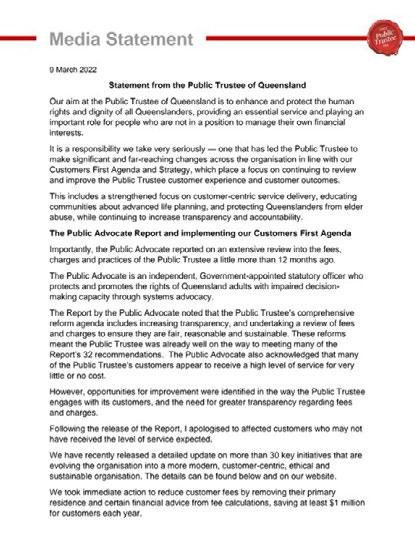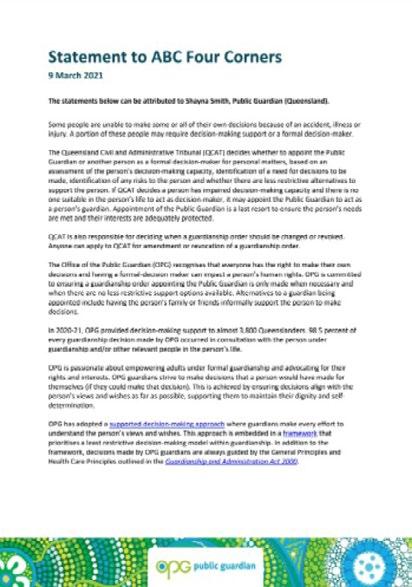
14 minute read
New Members
Prudence Juris

Dear Aunt Prudence,
The new grads have just started at our firm and I’m feeling left out. They get all the shiny new laptops and welcome drinks, but I still don’t know what I’m doing. When does firm life get better? - Middle Grad Syndrome Dear Middle Grad Syndrome Welcome to your second year of practice. You’re only a restricted practitioner and the expectations are higher, but the sheen has well and truly worn off. Your Aunt ain’t gonna lie — almost two decades of education and clerkships have all led to this moment, and it kinda blows. You’ve moved up the first step of the pyramid, but found out Giza has nothing on the rungs you still have to climb. Take solace, though, for there’s something you’ve forgotten. Like a younger sibling, the new grads bring with them opportunity. They’re keen. They’re fresh. And they want to be involved. So, like a remote auction participant talking to your agent, it’s time to have them do your bidding. That filing you’ve been putting off? Those boxes that need to be carted to court? The Lord giveth a grad, and the Lord taketh away your photocopying. This is when life starts to get better. Enjoy, Aunt Prudence Dear Aunt Prudence,

My firm has recently moved to a new office space that is entirely open plan. I’ve noticed that some people in the office, including my supervising Partner, are still getting used to the change. It’s only been a week and I’m already sick of overhearing their loud personal telephone calls and smelling the reheated tuna bake that they insist on eating at their desk every day. Will it ever end? - I Miss My Office Dear I Miss My Office You’re not alone. A large number of firms have recently turned against the dated private office layout in favour of cost-effective open plan spaces. While the change can have many positive ramifications – including greater opportunities for learning and collaboration between junior and senior lawyers – a few rules of etiquette should be observed. On the off-chance that your supervising Partner is reading my humble column, I shall spell out my top three tips to ensure open plan harmony: 1. Keep noise and distractions to a minimum: Noisy telephone conversations or habits such as tapping on the desk or fidgeting often can create an annoying distraction to those trying to concentrate. If you need to make a personal call to your child’s best friend’s brother’s orthodontist, perhaps use a break out room. 2. Be aware of smells: Within a tight space smells can be magnified, so use consideration when packing your lunch or snacks; especially if you dare to commit the cardinal sin of reheating a fish dish in the communal office microwave. Why don’t you dine al fresco or in the break room, rather than at your desk. 3. Respect another’s need to work: Just because an unassuming grad is sitting nearby, it does not mean they are available for conversation at all times (in fact, they’re probably frantically working on an impossible research task). Act respectfully and expect others to act in the same way. If all else fails, dear reader, you may benefit from working remotely until your colleagues have adapted to open plan life. All the best! Aunt Prudence
Do you have a question for your Aunt Prudence? Send all inquiries to younglawyers@lawsocietywa. asn.au and look out for your Aunt’s response in the next edition of Brief.
New Members New members joining the Law Society (March 2022 & April 2022)
Associate Membership
Mrs Jillian Hodges Murdoch University Mr Gabriel Merga Curtin University Mr Jordan Feinberg Murdoch University Mr Robert Mathew The University of Western Australia Mr Harrison Langsford The University of Western Australia Mr Michael Barry The University of Western Australia Ms Rachel Macy The University of Western Australia Mr Dallas Hodgetts University of Canberra Ms Madeline Quirk University of New England Ms Emma Wilson The University of Western Australia Mrs Malyque Neal The University of Western Australia Mr Ashton Godfrey The University of Western Australia Miss Teagan Joffe The University of Western Australia Ms Jenna Fuller The University of Western Australia Ms Emma Morhall The University of Western Australia Mr Javier Williams The University of Western Australia Ms Ann Roberts Murdoch University Mr Liam Aspinall Curtin University Miss Isobel Holling Joss Legal Mr Jacob Ferrell The University of Western Australia Ms Georgia Babun Murdoch University Mrs Deanna Ham Miss Abigail Gregorio The University of Western Australia Ms Anthea Todman Edith Cowan University Mrs Carla Machin The University of Western Australia Ms Alexandra Hamilton The University of Western Australia Mr Felix Attard The University of Western Australia Miss Alea Kaye Go The University of Western Australia Ms Peina Jin Murdoch University Miss Christina James The University of Western Australia Mr Nic Jones The University of Western Australia Mr Dalton Whittle The University of Western Australia Mr Obafemi Fayomi The University of Western Australia Miss Chene Delport Murdoch University Miss Bea Belonio Murdoch University Ms Joy Johnston Murdoch University Mr Chrispus Mukhooli Murdoch University Ms Rebecca Harms University of Notre Dame Australia Miss Sophie Walker Murdoch University Ms Polina Zhbanova The University of Western Australia Mr Julian Krohn The University of Western Australia Ms Nana Kwakwaa Akuoko-Tawiah The University of Western Australia Miss Kiasah Crookshanks Murdoch University Ms Savannah Greene Murdoch University Mr Brandon Yip The University of Western Australia Miss Emma Tirabosco Allens Mr Todd Montgomery Edith Cowan University Miss Ellis McMillan Edith Cowan University Miss Katherine Manderson Allens
Barrister Membership
Mr Christopher Mofflin Francis Burt Chambers
Ordinary Membership
Ms Connie Yan Clifford Chance Mr Steven Johnson WA Law Group Pty Ltd
Restricted Practitioner
Mrs Michelle Parsons Pricewaterhouse Coopers Mr Mukesh Dahiya BNT Legal Pty Ltd Mr Michael Clements Paterson & Dowding - Perth Mrs Rebecca Wastall Accident Claims Lawyers Mrs Pamela McWatters FMD Legal Ms Jessica Renae Smith Birman & Ride Mr Brodie Rodgers Andrew Levalds Barrister & Solicitor Mr Nimrod Amanuel Tottle Partners Miss Jovetta Johnson Roe Legal Services Ms Ida Jogic Lynn & Brown Lawyers Mr Emmanuel Morgan Savannah Legal
by Chris Burch
Chair, Young Lawyers Committee
Last month, Four Corners reported on public trustee and guardian systems nationally, in State Control. It is, as journalist Anne Connolly put it, a story of ‘Australians who say they’ve been virtually abducted by the state’. A story which, perhaps surprisingly, ‘in most of the country it’s illegal for [those Australians] to talk about … publicly — and [journalists] could go to prison for reporting …’.
To air the report, Four Corners had to bring proceedings in Western Australia and Queensland to allow individuals subject to the public guardian and trustee systems to have their own stories told.
The report uncovered issues of people being charged excessive fees for no apparent service, being effectively confined to nursing homes and hospitals, and being denied access to their own money to seek reviews of guardianship and administration orders.
One aspect of the report concerned the WA Public Trustee. A woman moved in with her daughter in 2012, shortly before being diagnosed with early onset Alzheimer’s. She is reported as having said to her daughter ‘what’s mine is yours’, after which her daughter says she spent her mother’s money on things including household living expenses and a car to transport her family, her mother and her mother’s wheelchair. The Public Trustee was appointed in 2015, and questioned the spending. After her mother’s death, the Public Trustee reported the daughter to the police. She was arrested and tried over 5 days, but acquitted by a jury within 10 minutes. The Public Trustee took almost $12,000 from the mother’s estate for building the police case against her daughter. The daughter said she was ‘a shell of who I was. I was broken and exhausted. I was completely depleted. That experience took away from me the ability to grieve my mom when she died’.
The report highlights how secretive guardianship and administration proceedings are. There are, of course, good reasons for that secrecy (see her Honour Justice Pritchard in CD [2020] WASAT 41 [35] – [37]). It is consistent with the approach of courts and tribunals to protect vulnerable people: ABC v Public Trustee [26]. 1 However, as Four Corners makes clear, some matters that should be brought to the public’s attention are instead remaining hidden.
The operation of the confidentiality provisions of the GA Act
Until the ABC’s application was decided in Australian Broadcasting Corporation v Public Trustee [2022] WASC 85, there had been no judicial consideration of schedule 1 clause 12(8)(d) of the Guardianship and Administration Act 1990 (WA) (GA Act): [23]. That provision establishes an exception to the strict confidentiality requirements otherwise attaching to proceedings under the GA Act for reports published ‘in pursuance of the direction of the Tribunal or of a court’.
The extent of those confidentiality requirements is potentially surprising. Unlike other proceedings in courts and tribunals, the GA Act starts from the position that all documents filed in proceedings are confidential and that names of persons involved as well as witnesses cannot be published: [25].
Section 112 of the GA Act makes it an offence, punishable by fine or imprisonment, for anyone other than particular people (eg, represented people, parties, or the Tribunal and its staff) to access a document or material lodged with or held by the Tribunal for the purposes of any application.
Section 113 prescribes a fine for, in effect, the unauthorised disclosure of any personal information obtained in the course of duty relating to a represented person, or person in respect of whom an application is made, by any person performing a function under the GA Act.
Schedule 1 clause 12 makes it a crime punishable by fine or imprisonment of up to 1 year to report to the public any account of any proceedings under the GA Act that identifies particular people, including parties to the proceedings or people related to or associated with them. It prohibits the disclosure of any particulars of a range of matters, if sufficient to identify the person to a member of the public, including a person’s name, work or home addresses, physical description, employment, relationships, interests or beliefs, or property they have an interest in or are associated with.
Nor can the person’s picture be included in a report, nor their voice be broadcast if it could be identified by a member of the public.
As her Honour Justice Hill noted, those provisions impose strict requirements of confidentiality in relation to all documents and personal information held by the Tribunal in relation to proceedings brought under the GA Act: [15].
The ABC’s application
The ABC brought its application under schedule 1 clause 12(8)(d) on grounds including that it would be of public benefit to shine a light on the mother’s experiences in the Tribunal, as well as the experience of having her financial affairs administered by the Public Trustee: [2]. The ABC contended the making of orders allowing the report to be broadcast would facilitate the public’s right to know and would be in the public interest: [2].
The ABC’s evidence was that to convey a story persuasively and enable viewers to form their own views on the subject matter of the story, it was important to include the name and image of the person who the story is about. That was particularly the case in long form stories: [9].
The adult children of the mother over whose affairs the Public Trustee had been appointed administrator consented to their mother being identified by name and image, and for each of them to be identified in the report: [11]. They gave evidence that there were important reasons for their mother’s story to be told, including that their experience demonstrated ‘a lack of cultural understanding’ by the Public Trustee: [11].
What was and will be required to publish reports of Western Australian guardianship and administration proceedings?
Justice Hill began by acknowledging that the primary concern of the Tribunal in determining any application will be the best interests of any represented person, or of a person in respect of whom an application is made: [14].
Justice Hill noted that the GA Act makes plain that applications made under it are an exception to the principle of open justice, unless the court makes an order allowing publication: [27].
Her Honour considered that the ordinary meaning of ‘notice’ and ‘report’ in schedule 1 clause 12(8)(d) were not restricted to meaning documents or reports filed or evidence given by witnesses in proceedings. They extended to the proposed Four Corners report: [30].
As to exercising the discretion under that clause, Justice Hill considered it conferred a general discretion on the court in unconfined terms. That broad discretion is to be exercised by taking into account all relevant facts, matters and circumstances, paying careful attention to whether the identity of someone and their private information should be disclosed to the public and whether that is the right thing to do: [33] – [36].
Further, the court should not place any constraints on the exercise of discretion not found in the express terms of the GA Act; matters logically relevant to its exercise should only be excluded if such an exclusion is implied from the subject matter, scope and purpose of the Act: [37]. Relevant matters include relevant aspects of public interest, including in personal privacy and freedom of communication, as well as the position (if known) of the person who is subject of any application, and whether there is any opposition to the application: [37].
Relevant factors also include whether the application is in the best interests of the party the subject of the application, whether that party consents to the application, whether the welfare of the person will improve or suffer if the publication is allowed, how publication will impact on any relevant relationships, whether there is any opposition to orders being made, and whether there is public interest in the publication: [37].
As to the ABC’s application, Justice Hill noted that the administration orders were made more than 5 years ago, and that the children’s mother had died not long afterwards: [39]. Her Honour also recorded the children’s active support for the application and consent to being identified, with no one objecting: [39]. The hearing before the Tribunal was also said not to be the focus of the Four Corners report, but instead the family’s experience of the orders and their interaction with the Public Trustee: [40].
Justice Hill accepted that there was a public interest in the community understanding how the Public Trustee interacts with members of the community, particularly those from a multi-cultural background: [40]. Her Honour also accepted there was a public interest in the community having a proper understanding of the GA Act and the role of the Public Trustee: [40]. On that basis, Justice Hill granted the application, subject to an undertaking that the ABC would not broadcast any report of the proceedings before the Tribunal, or disclose medical or any other personal information beyond that necessary to provide a fair and accurate report: [41].
[2022] WASC 85
JURISDICTION : SUPREME COURT OF WESTERN AUSTRALIA IN CHAMBERS
CITATION : AUSTRALIAN BROADCASTING CORPORATION -v- PUBLIC TRUSTEE [2022] WASC 85
CORAM : HILL J
HEARD : 4 MARCH 2022
DELIVERED : 8 MARCH 2022
PUBLISHED : 11 MARCH 2022
FILE NO/S : CIV 1196 of 2022
BETWEEN : AUSTRALIAN BROADCASTING CORPORATION Plaintiff
AND
PUBLIC TRUSTEE Defendant
Catchwords:
State Administrative Tribunal - Confidentiality of proceedings under Guardianship and Administration Act 1990 (WA) - Application to direct publication of a notice or report under Guardianship and Administration Act 1990, sch 1, cl 12(8)(d) - Whether general discretion to make direction or whether direction is subject to there being exceptional circumstances - Proper construction of cl 12(8)(d) - Application allowed
Legislation:
Family Court Act 1997 (WA) s 243(8)(d) Family Law Act 1975 (Cth) s 121(9)(d) Guardianship and Administration Act 1990 (WA) sch 1, cl 12(8)(d)
Page 1
Click the thumbnail to view the decision of Australian Broadcasting Corporation v Public Trustee [2022] WASC 85 Click the thumbnail to view the full statement from the Public Trustee of Queensland Click the thumbnail to view the full statement from Queensland’s Public Guardian

Key takeaways
The decision in ABC v Public Trustee makes clear that applications may well have to be made where reports about the conduct of the Public Trustee in particular cases are to be broadcast or published.
Importantly, the Court will have power to make orders allowing the broadcast or publication of matters that are otherwise required to be kept confidential under the GA Act. The Court may well be receptive to arguments founded in the public interest in the community better understanding the operation of the GA Act and the Public Trustee.
That result means that the Public Trustee and the Tribunal will not be free from scrutiny in particular cases in which guardianship and administration orders are made.
It remains to be seen whether that scrutiny, including through the work of Four Corners, will have a significant effect on the issues that appear to exist in the current system.
End Notes
1 Subsequent paragraph references are to the decision in ABC v Public Trustee.










